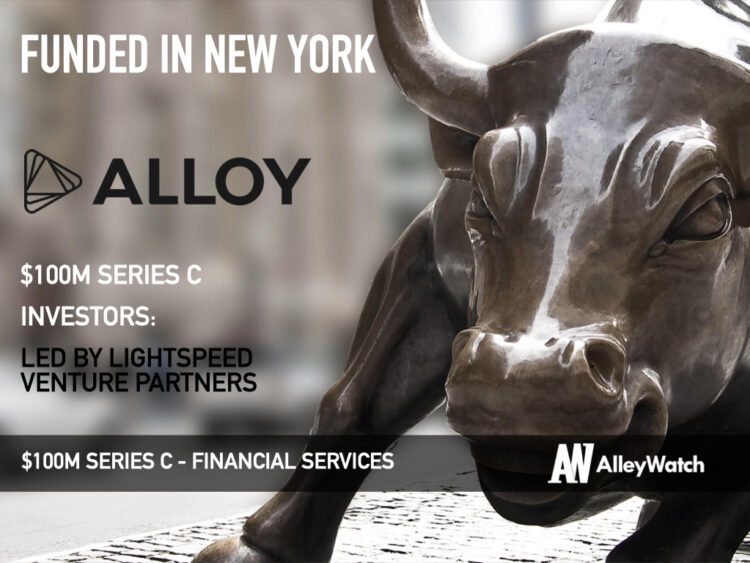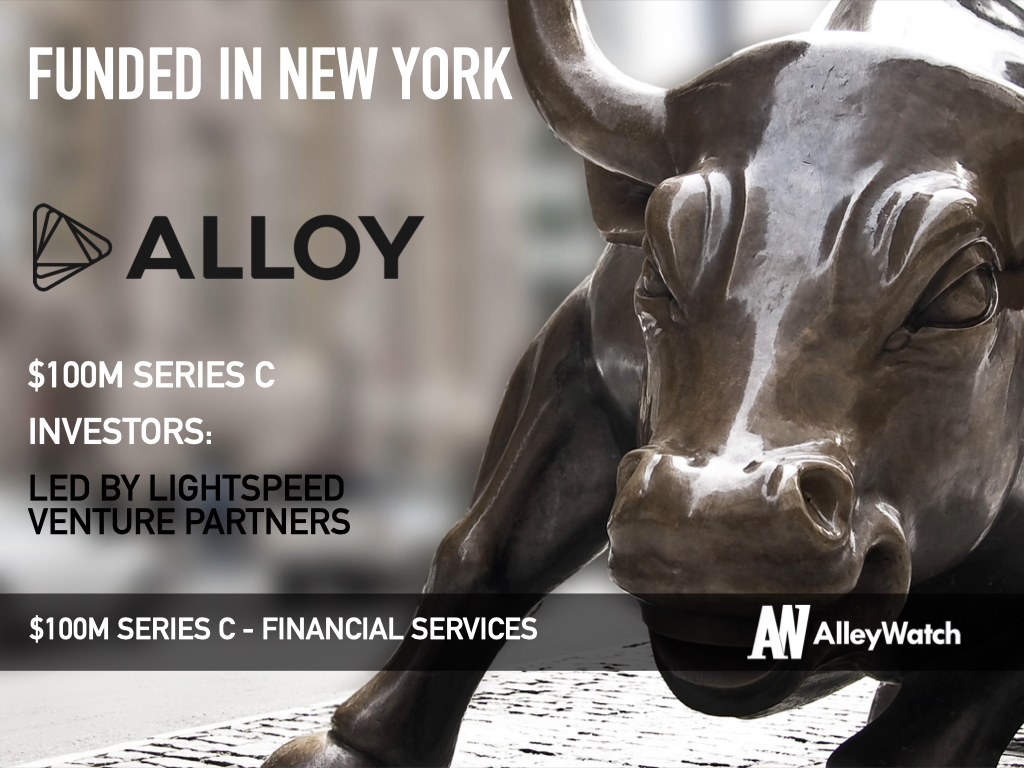Know Your Customer (KYC) and Anti-Money Laundering (AML) requirements typically require financial institutions to rely on numerous third-party data providers for both onboarding and ongoing monitoring. Digitally-focused financial providers (neo-banks, fintech startups, global banks, and platform banks) face the decision to build systems in-house, a resource-intensive undertaking, or rely on third-party integrations that are available in order to be compliant. Alloy, a complete identity decisioning and monitoring platform, makes that decision easy with its infrastructure-as-a-service platform. Launched in 2015, the company streamlines the onboarding process aided with automation and supports the customer lifecycle with ongoing monitoring to flag potential fraud and minimize risk. Alloy integrates with 120+ sources to ensure that its customers are able to build a complete and accurate picture of their customers and their financial transactions. The company has 200+ clients and has tripled its revenue in the last year.
AlleyWatch caught up with Alloy Cofounder and CRO Laura Spiekerman to learn more about NYC’s newest unicorn, how streamlining identity decisioning and monitoring spurs innovation in digital finance, the company’s strategic plans, latest round of funding, which brings the total funding raised to $155.8M, and much, much more.
Who were your investors and how much did you raise?
We raised $100 million in Series C funding led by Lightspeed Venture Partners’ Justin Overdorff, with participation from existing investors Canapi Ventures, Bessemer Venture Partners, Avid Ventures, and Felicis Ventures. This new round brought our valuation to $1.35 billion, with a total amount raised to over $150 million.
Tell us about the product or service that Alloy offers.
Since our inception in 2015, our focus has been helping financial institutions (FIs) automate identity decisioning during the onboarding process. In 2021, our mission to evolve how identity decisions are made took another leap forward, adding transaction monitoring capabilities to our platform. This serves as the next step in creating a complete identity decisioning profile that paints a 360-degree picture of any customer’s identity and associated risk throughout their entire lifecycle with a financial institution.
Transaction Monitoring automates decisioning on high-risk events and transactions, helping FIs flag suspicious activity to fight fraud and meet BSA/AML requirements. FIs get a holistic view of their customers’ ongoing risks with real-time API activity monitoring, and easy-to-use case management lets them identify and act on flagged activity right within Alloy.
 What inspired the start of Alloy?
What inspired the start of Alloy?
Alloy was built to solve a problem. My cofounders, Tommy Nicholas (CEO), Charles Hearn (CTO), and I saw increased demand from financial services firms to digitally onboard customers, as well as a massive gap in the market for offering a holistic approach to assessing risk during the process.
When a person walks into a bank to open a bank account, they bring multiple forms of identification which the bank confirms and then are able to open an account. When doing this digitally — it’s much more complex. And since the pandemic, doing it digitally has become increasingly expected. Fraud is continuously evolving and exists far beyond initial customer onboarding. To support these new challenges, our technology’s increased capabilities will help financial institutions combat fraud and money laundering from multiple angles. After a customer opens an account, Transaction Monitoring takes over to continuously review their financial activity, flagging risky behaviors for review – behaviors like excessive transactions in a given timeframe. With this extended capability, our API-based platform can help build a complete identity profile that encompasses the entire customer lifecycle.
Traditionally, to address identity decisioning, financial firms would pursue building their own in-house. The maintenance involved in even a minimally-built out platform is significant: finding, testing, integrating, and standardizing new data sources, changing rules, and all the exhaustive compliance/audit work required. There is limited ability to learn from others, benchmark across the industry, and benefit from larger-scaled models. Identity is not (and should not be) a strategic competency: companies have limited development resources and should be focusing those resources on building a great product. In-house builds rely on hard-coded data ingestion and decision logic that are hard to understand or optimize. They also lack the back-office automation/workflow efficiencies, auditable decision trail, testing and optimization, reporting, analytics, and more that Alloy’s technology provides.
How is Alloy different?
Our platform is helping democratize banking and financial services by helping traditionally underserved financial institutions, like small credit unions and local banks, expand digital product offerings to better serve their communities. Our technology allows financial institutions to remove the bias in decision-making by providing easy access to alternative data sources to help verify applicants who might not have traditional identification, such as a driver’s license. Our mission is to ultimately create a future in which banking is accessible for all.
Digital access to banking and financial services is no longer just a luxury but is essential for individuals and businesses. Identity in particular is the fundamental layer behind all financial services but has seen little in the way of innovation in the last few decades. The people who are difficult to identify online are not Wall Street bankers, they’re underserved populations; underbanked communities, immigrants, students, young people, people with no credit. Our platform is not just making life easier for banks and fintech companies, but it’s making banking more accessible to populations that have previously been written off.
What market does Alloy target and how big is it?
Financial institutions that serve consumers, as well as small to midsize businesses that need to meet KYC/AML requirements and prevent fraud could benefit from Alloy. Our typical buyers range from early-stage to enterprise fintech companies and small or regional banks to top 20 banks.
What are your post-COVID office plans?
A proud NYC company, we recently opened our new, more spacious office between Noho and Union Square this past July to give fully-vaccinated employees the option of joining when they choose to. We will remain hybrid for the foreseeable future – having some employees remain fully remote.
A proud NYC company, we recently opened our new, more spacious office between Noho and Union Square this past July to give fully-vaccinated employees the option of joining when they choose to. We will remain hybrid for the foreseeable future – having some employees remain fully remote.
What was the funding process like?
Fast. We are lucky to have had a great group of investors to begin with and bringing Lightspeed on with Justin was natural. Justin was previously an angel investor and very familiar with what value we were bringing to the industry.
What are the biggest challenges that you faced while raising capital?
One of the biggest challenges you always face while raising capital is not slowing down. How do you keep a company moving at 100 mph while you are shifting your focus to fundraising?
What factors about your business led your investors to write the check?
The pandemic spurred a lot of digitalization progress in banking but also opened a lot of opportunities for the fintech community. With this opportunity, we have also seen a dramatic rise in fraud as well as a new level of sophistication. The combination of increased demand and more risk has made Alloy a necessity. There is a more critical need for infrastructure like BaaS, fraud mitigation, and other kinds of automation to support the rise of new fintech tools and services.
What are the milestones you plan to achieve in the next six months?
Improving the developer experience is a significant priority for us, especially when it comes to bringing new products to market. We want to make building a fintech product as easy as building an e-commerce product. Identity and its associated risk isn’t something businesses should be figuring out, it should just be something they install. As Alloy grows into a multi-product platform for the full customer identity lifecycle, we can not only help make risk easier to understand but also further industry innovation by making fintech products easier to build.
Improving the developer experience is a significant priority for us, especially when it comes to bringing new products to market. We want to make building a fintech product as easy as building an e-commerce product. Identity and its associated risk isn’t something businesses should be figuring out, it should just be something they install. As Alloy grows into a multi-product platform for the full customer identity lifecycle, we can not only help make risk easier to understand but also further industry innovation by making fintech products easier to build.
What advice can you offer companies in New York that do not have a fresh injection of capital in the bank?
Don’t run out of money. Do non-scalable things to get the next customer or two; don’t worry about the next 100. Customer love and growth are more important than scale.
What’s your favorite outdoor dining restaurant in NYC
Graziella’s Pizza in Brooklyn.




